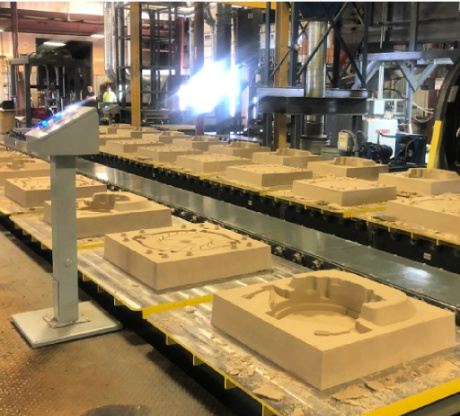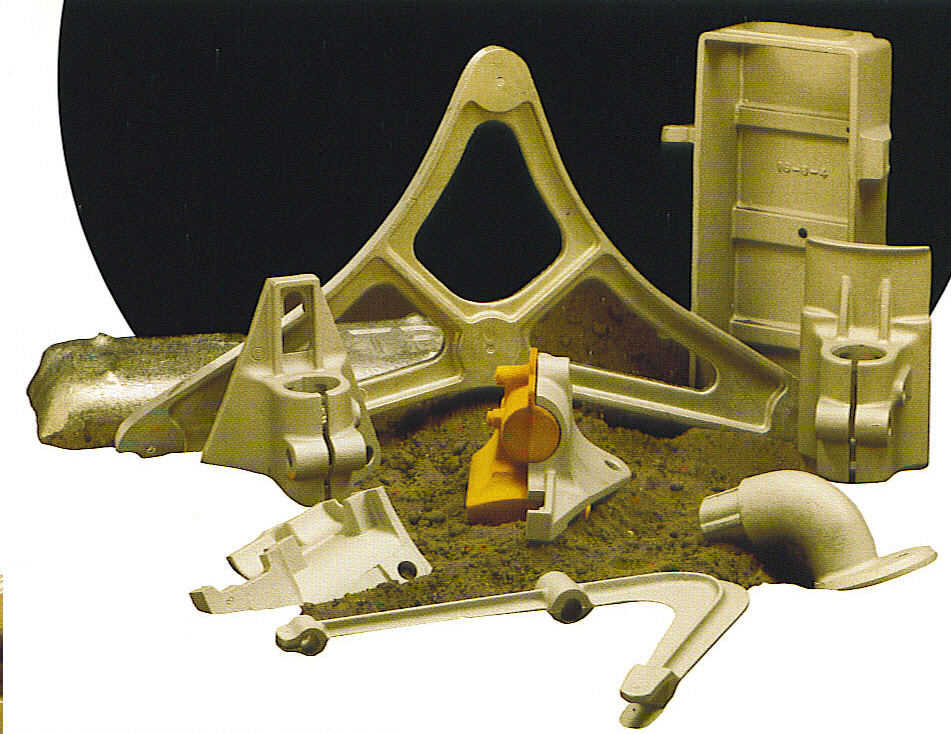The Value of Aluminum Foundry ahead of time Industrial Manufacturing Techniques
The Aluminum Foundry plays a critical role in the evolution of commercial production strategies. Its light-weight properties and convenience make Aluminum a perfect option for numerous applications. Advanced casting methods, including die spreading and 3D printing, permit for detailed styles and automation. As the market moves towards automation and sustainability, concerns emerge concerning the future trajectory of Aluminum shops and their influence on making performance. What challenges and technologies lie in advance?
The Function of Aluminum in Modern Manufacturing
Aluminum plays an essential duty in modern-day manufacturing due to its unique residential properties and adaptability. As a lightweight steel, it especially decreases the overall weight of items, improving fuel performance in transportation and aerospace industries. Its superb deterioration resistance warranties long life and dependability, making it ideal for numerous applications, from automotive elements to developing materials. Light weight aluminum's pliability permits it to be conveniently shaped into complicated styles, facilitating cutting-edge item advancement. Its conductivity makes it ideal for electric applications, contributing to developments in electronics and renewable power modern technologies. The adaptability of Aluminum likewise prolongs to its recyclability, which adds to lasting manufacturing practices. As markets proceed to prioritize effectiveness and ecological duty, Aluminum stays an important material, cultivating advancement and enhancing production procedures across numerous fields. Its duty is not just functional; it is foundational to the evolution of contemporary commercial techniques.
Key Advantages of Aluminum Casting
The benefits of Aluminum casting are significant, contributing to its appeal in different commercial applications. One essential advantage is the lightweight nature of light weight aluminum, which minimizes transportation prices and improves fuel performance in aerospace and auto sectors. Furthermore, light weight aluminum's outstanding deterioration resistance extends the life expectancy of actors components, making them suitable for aquatic and exterior environments.
Furthermore, Aluminum spreading allows for complicated geometries and complex styles, giving suppliers with greater adaptability in item growth - Aluminum Castings. The product additionally displays great thermal and electric conductivity, making it ideal for a variety of digital applications
Another advantage is the fast solidification process, which causes finer microstructures and boosted mechanical buildings. Moreover, Aluminum can be recycled repeatedly without shedding its inherent top qualities, advertising sustainability in manufacturing methods. These benefits underscore Aluminum spreading's essential function in progressing industrial production techniques while fulfilling varied design requirements.
Cutting-edge Casting Methods and Technologies
Various cutting-edge casting strategies and innovations have arised to enhance the effectiveness and high quality of Aluminum manufacturing. Among these, pass away casting sticks out as a method that enables high-volume manufacturing of complex forms with superb dimensional precision. This technique utilizes high stress to inject molten Aluminum into a mold, resulting in smooth surfaces and lowered requirement for machining.
An additional significant improvement is making use of 3D printing for mold and mildews, which enables fast prototyping and decreases preparations considerably. This modern technology enables intricate layouts that conventional approaches might struggle to attain.
Furthermore, investment casting remains to progress, using innovative materials and procedures to produce accuracy parts. The adoption of computer system simulations in the spreading procedure has further enhanced end results by forecasting prospective flaws and enhancing mold styles. Together, these developments are changing Aluminum shops, leading the way for much more effective manufacturing and superior product top quality in various markets.
Ecological Impact and Sustainability in Aluminum Foundries
As industries significantly focus on sustainability, the ecological influence of Aluminum factories has actually come under scrutiny. These centers are considerable contributors to greenhouse gas exhausts and power intake, mostly because of the energy-intensive processes included in melting and spreading aluminum. The removal of bauxite, the key ore, more worsens ecological issues, causing habitat destruction and pollution.
In feedback to these obstacles, many Aluminum foundries are taking on much more lasting practices (Aluminum Castings). Advancements such as reusing scrap Aluminum significantly lower energy use and exhausts, as reusing calls for only a portion of the energy required for key manufacturing. In addition, the combination of renewable resource sources, such as solar and wind power, is gaining grip in shops intending to reduce their carbon footprint
Moreover, advancements in technologies that minimize waste and boost resource performance are coming to be necessary for the future of the Aluminum market. These initiatives highlight the change towards a much more ecologically liable and sustainable strategy in Aluminum foundries.
Applications of Aluminum Spreading Throughout Industries
Aluminum casting locates widespread application across diverse markets, owing to its beneficial buildings such as light-weight, corrosion resistance, and outstanding machinability. In the auto industry, manufacturers use Aluminum spreadings for engine elements, transmission real estates, and architectural components, enhancing gas efficiency and performance. The aerospace market take advantage of aluminum's strength-to-weight ratio, utilizing it in airplane structures and parts, which add to lowered overall weight and enhanced gas economic situation.
Moreover, the consumer electronic devices sector employs Aluminum castings for housings and chassis, combining aesthetic allure with sturdiness. In construction, Aluminum castings are used for home window frames, doors, and building aspects, giving visit both functionality and design versatility. Additionally, the marine industry utilizes Aluminum spreading for watercraft hulls and installations, ensuring resistance to saltwater corrosion. This versatility across various fields underscores Aluminum spreading's critical duty in modern-day commercial applications, driving technology and performance.
Difficulties Faced by Aluminum Foundries
Aluminum foundries encounter substantial difficulties in conference rigid ecological guidelines while preserving operational effectiveness. In addition, a shortage of competent labor intensifies these problems, hindering performance and advancement. Attending to these problems is vital for the sustainability and growth of the Aluminum casting industry.
Ecological Regulations Conformity
Although Aluminum foundries play a vital function in industrial production, they often encounter substantial obstacles in abiding by ecological laws. These regulations are developed to decrease air and water pollution, waste generation, and energy usage. Shops normally must buy advanced innovations to fulfill strict emission criteria and handle hazardous products properly. The costs related to these upgrades can stress financial sources, specifically for smaller operations. In addition, the intricacy of traversing regulative frameworks can cause conformity mistakes, leading to pricey fines. In addition, constant adjustments in regulations need shops to adjust quickly, often requiring ongoing training and updates in functional practices. Balancing regulative compliance with production efficiency remains a crucial issue for the Aluminum Foundry industry.
Competent Labor Lack
As the Aluminum Foundry market remains to develop, a pressing challenge has emerged: an experienced labor lack that endangers the industry's efficiency and growth. This scarcity is primarily sustained by an aging labor force and the absence of rate of interest amongst more youthful generations in pursuing careers in manufacturing. Numerous knowledgeable work require specialized training and experience, which are increasingly hard to discover. Light weight aluminum shops battle to preserve operational performance, leading to delays and enhanced production prices. Efforts to attract brand-new skill via apprenticeship programs and partnerships with instructional organizations are underway, yet these initiatives require time to yield outcomes. Without a robust increase of knowledgeable workers, the Aluminum Foundry sector may encounter significant obstacles in satisfying the needs of contemporary industrial manufacturing.
Future Fads in Aluminum Foundry Production Techniques
The future of Aluminum Foundry production methods is poised to be significantly shaped by innovations in automation and sustainable material advancements. Automation is expected to improve performance and precision in Foundry processes, minimizing labor prices and minimizing human error (Metal Castings). An expanding emphasis on sustainability will drive the development of environment-friendly products and practices, aligning the sector with international environmental goals.
Automation in Foundry Processes

Lasting Product Innovations
While the Aluminum Foundry industry welcomes automation, an identical focus on lasting material technologies is improving manufacturing techniques for the future. Improvements in recycling procedures are making it possible for factories to utilize post-consumer light weight aluminum, significantly reducing power consumption and waste. The development of environment-friendly ingredients and finishes is minimizing the environmental influence associated with standard materials. Developments in light-weight Aluminum alloys are improving efficiency while advertising sustainability, making products not just much more efficient yet likewise simpler to recycle at the end of their life cycle. As the market adapts to more stringent environmental guidelines, these lasting techniques are ending up being vital. Inevitably, the commitment to sustainable product innovations in Aluminum foundries will drive improved efficiency while resolving international environmental challenges.
Frequently Asked Inquiries
How Does Aluminum Compare to Various Other Metals in Casting?
Aluminum provides advantages over various other steels in casting, including lower melting points, outstanding fluidity, and resistance to corrosion. These residential properties make it possible for detailed layouts and anchor faster manufacturing, making Aluminum more tips here a recommended selection for many industries.
What Precaution Are in Location in Aluminum Foundries?
Security procedures in Aluminum shops include protective equipment for employees, appropriate ventilation systems, normal tools upkeep, fire avoidance procedures, and stringent adherence to safety regulations, ensuring a secure setting while decreasing the danger of accidents and injuries.
How Are Aluminum Alloys Selected for Specific Applications?
Aluminum alloys are picked based upon mechanical properties, corrosion resistance, and thermal conductivity. Engineers examine application demands, considering factors like weight, toughness, and environmental conditions, ensuring perfect efficiency for certain industrial or business uses.
What Is the Average Life-span of Aluminum Cast Products?
The typical life-span of Aluminum cast items normally ranges from 20 to 50 years, relying on environmental variables, usage problems, and maintenance techniques. Appropriate treatment can greatly prolong their functional durability and performance efficiency.

Are There Accreditations for Aluminum Foundry Processes?
Yes, there are certifications for Aluminum Foundry procedures, consisting of ISO 9001 for high quality monitoring systems and particular sector standards like ASTM and SAE, which ensure adherence to top quality and security in Aluminum manufacturing and casting.
Aluminum foundries play a crucial role in industrial manufacturing, they often face significant difficulties in conforming with environmental policies. Aluminum shops battle to preserve functional performance, leading to delays and enhanced manufacturing expenses. The future of Aluminum Foundry production methods is poised to be significantly formed by developments in automation and lasting product innovations. Significantly, automation is forming the landscape of Aluminum Foundry manufacturing methods, driving effectiveness and accuracy. While the Aluminum Foundry market welcomes automation, an identical emphasis on lasting product technologies is improving production strategies for the future.